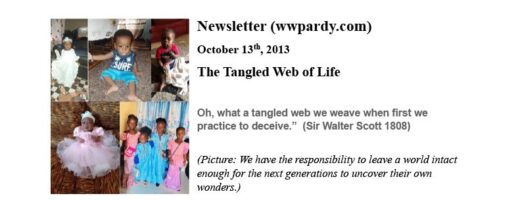We keep hearing the phrase “to big to fail” in the context of banks, corporations and even governments during this economic transformation that is affecting the entire world. It has become a mantra of those charged with “fixing” the economy; as if it could be fixed. This somehow justifies the approach to the solution that is based on throwing resources to those “too big to fail” entities, which allows them to grow even bigger. This solution is exacerbating the situation ensuring a much bigger collapse and fallout beyond imagination.
The main causes of this current economic fiasco has not been understood or addressed. One thing is certain the ad hoc approach to the perceived causes is complicating not only the diagnosis, but the prescription of an appropriate treatment. A cure appears a long and distant hope. Instead of taking a deep breath, assessing the width and breath of the dilemma and clearly identifying the many root causes, each symptom, as it appears, is being treated. Recently, in a news article, there was reference to “bail-out fatigue” as if bailing would somehow fix the leaks. The approach to addressing this particular financial malaise is akin to having two groups in a leaky boat; one bailing water out and the other pouring water in. Everybody is so busy bailing and pouring that there is no one with time to identify where the leaks really are.
Anyone familiar with history, my expertise is very limited, realizes that what is happening is similar to the experiences in economies at other times; crisis like this are not new. But it appears that human memory is limited and there is a predilection to revise, misinterpret and imagine history in ways that benefits an issue or cause. It would be my suggestion that history, like life, is spiral. We encounter similar challenges over and over again, but each time there is a difference. Each experience provides learning and change, as a result, when we encounter the same issue another time, we recognize it. But, what we seem to fail to appreciate is that although, it appears to be the same it isn’t; similar maybe, but not the same. The dilemma is that the learning from each experience is limited, but as humans, we convince ourselves it is complete. Each time we think that now we have the solution. But, there is always new learning to be gained from every experience.
So, in our current economic transformation, we refer to past recessions, previous economic shifts and even major economic depressions, as if this time, our knowledge and learning from all of these will provide the ultimate answer. There are suggestions in current rhetoric that, this time, our solutions will ensure it never happens again. This implies that, in fact, learning and history will stop with this crisis; such is our arrogance. Obviously, from any experience, there are a variety of different lessons and many more interpretations of these lessons. Some of what is considered as learning is mere figments of overactive imaginations that become enhanced over time. The rush to provide solutions, especially in our current hyper-active society, pushes those involved to apply these “lessons” as if they were definitive solutions; which they weren’t and aren’t.
What is required most of all, is time and space, in order that a proper evaluation is carried out of current causes of the malaise and how they relate to those from past times. What is even more necessary is an understanding that, while many issues might be similar, the experience in itself is different. Hence the saying “hindsight is always 20-20 is not necessarily true in this particular case. Most of us fortunate to have sight, even those who have it improved with corrective lenses, have near 20-20 vision. Yet, we still miss seeing many things in life. Especially when there is some urgency, a sense of fear or foreboding or sheer terror facing us. Our minds distort our concentration and focus. That appears to be what is happening now during this current crisis, among all those pushing solutions. It might be beneficial if they all took a step back, took several deep breaths and allowed time for their brains and eyes to gain focus and at the same time reflect a little more on history. This time and reflection might provide a little clearer picture of the root causes of the current problem and the naissance of the solutions.
Perhaps they will come to appreciate that throughout history “big” always fails. That’s why at this point in time there are no empires and even the humungous influence that America has had, since the collapse of the Soviet Empire, is rapidly dissipating and waning. Big governments, institutions and corporations (some of which are remnants of previously failed very large enterprises) are disintegrating, even while they are being propped up with boundless cash to be paid for by the next generations.
Much of this can be attributed to human ego and the need, by some, to gather, hoard and control. The reality is that the systems created to support such “big” entities are much too complicated and complex and the scale of the activities much too unwieldy to be sustainable. We have created a myth that economy is about growth, development about expansion and management is about systems; when in fact; all three are about people and balance. What usually starts off as small, is expanded, and then accumulates, necessitating centralization and control. Because it is much easier to control that which is small, centralized management of an elite power base is created and a “system of control” is established. In history the use of centralized power has only been able to temporarily control, even though sometimes it is for years. But eventual it fails. Power, in and by itself, is the Achilles heel of any system and control is the virus which inflicts an incurable terminal disease. This is true in regimes whether private or public, dictatorial or democratic and where egos flourish.
All of this is contrary to the universe, nature, and life. These natural structures are, in fact, bigger than that which any human mind can comprehend. They are not centrally controlled, in the way most humans consider control. These large entities comprise of millions of small, even micro, elements, all interacting, evolving and seemingly out of control, but in essence they self manage. There are many who might suggest that there is one who is in control and that is God. The image (usually of a man) at some sophisticated master control station comes to mind. But humans have always had a need to create images that they comprehend; for them it is a form of control. It also provides a believable foundation for those who wish to create systems in order to have control.
I am neither diminishing nor dismissing the concept of God because by whatever name you choose, there is a higher power in charge of all of this; a deity that can’t be fathomed by the mind only felt by the soul. The soul itself is a small, invisible, yet powerful component of life. It can be neither seen or touched, but we know it exists because we feel and experience it. The soul appears to have less power than the mind, but much more influence on our lives. The “mind” of the deity that created the universe, nature and life, obviously is far greater, less controlling and more humble that the minds of the humans to which it gave life. There is no need to control or manage the “big” things it created because it is the small, even miniscule, all with a role that contribute and operate autonomously, but collectively, in the functioning of the most complex of structures imaginable.
It appears that the difference is in the limits that life gave us as humans. We have the ability to make new things, even complex things, yet we have this overarching need to control to systemise and manage that which we develop. We know, or should know that throughout history big things have always failed. Yet we continue to want to make small things big so that we can control, contain and hoard more and more. There are countless historical examples of those who wanted to control, not only the world, but life itself.
We refuse to recognise that all things evolve and as small things become bigger they eventually reach a critical point where they collapse into themselves; disintegrating back into many small particles. Some would suggest that the universe is continually expanding, yet it hasn’t collapsed, because as science has identified there are many and continuing transformations that occur (naturally) and there are unfathomable black holes that appear to disappear into themselves. What is apparent is that collapse and evolution are a fundamental aspect of this system, and it is, like nature, a system which self manages.
This takes me back to the main thesis of this essay which is to challenge the concept that anything is “too big to fail”. My argument is that everything, over time, fails transforming into something else and “big” is no exception. It is far better to manage the demise, allowing natural evolution and collapse to occur in a meaningful way. Feeding it and allowing it to grow even bigger, only delays the inevitable and enhances the fallout when eventually it does collapse.
We are experiencing the natural evolution of an economy that was expanding uncontrollably, and was definitely not sustainable. The economy became, for some, “too big to fail”. Blindly they are still attempting to revive it, not only to allow it to continue, but to grow it bigger, by throwing at it whatever resources they can beg, borrow or steal. They conveniently ignore that continued growth will only destroy, over time, our living and breathing world and subsequently ourselves. That is why the economy needs re-invention; not fixing.
We should take a few lessons from human history and some wisdom from our natural world and the universe: it is the small (even the minuscule) that is most important; it is freedom and shared management that is necessary; and it is humility that always usurps ego in life. Natural life, while complex, is much more simplistic than any of the contrived systems of management that humans create to control. Those that would contain and control never seem to understand that it is influence that matters; not the power of control. Contemplation and meditation are tools that provide the path to wisdom. These are much more potent than trained minds that spawn big egos and self-belief; rather than shared power with a much greater source. Accepting this, of course, requires humility; sadly lacking in those that would be leaders today.
Written by Bill Pardy,
December 6th, 2008


